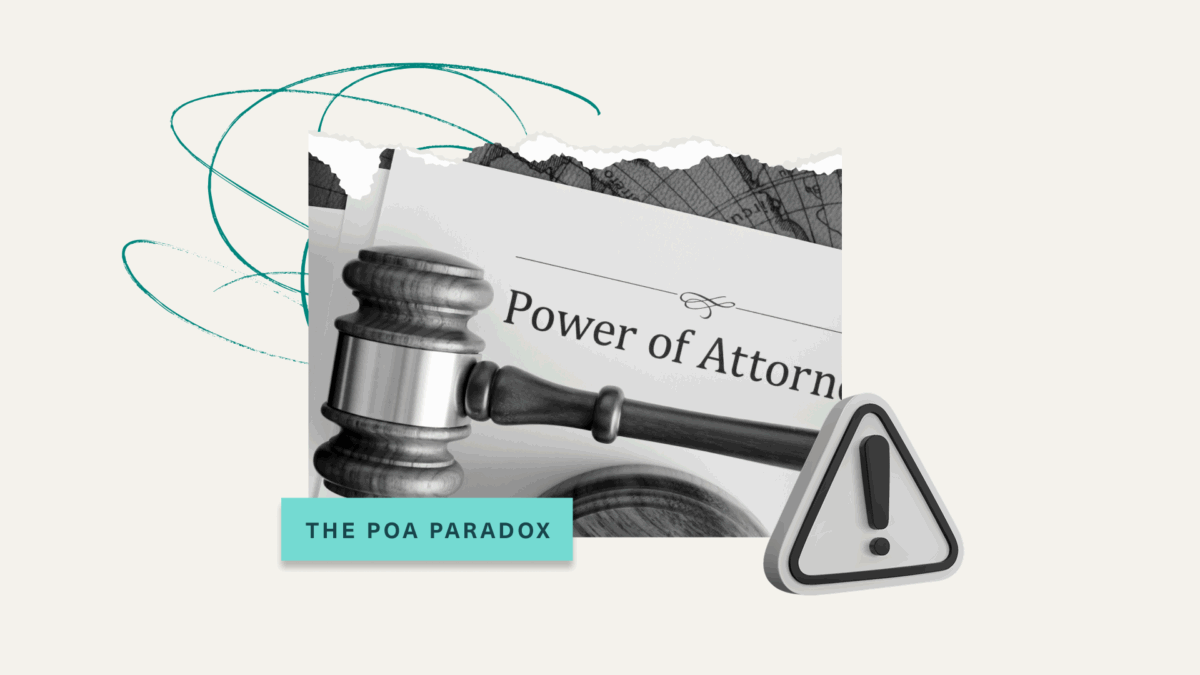For many clients, a Durable Power of Attorney (POA) is a set-it-and-forget-it document, signed years ago and filed away. The traditional wisdom is that even with changes in law, old POAs are “grandfathered in” and remain perfectly valid.
While technically true if the statutes governing the POA explicitly recognizes the continued validity of POAs executed prior to a more recent change in the state, the unfortunate reality is that a POA’s true measure isn’t its validity in the eyes of the legislators, but its practical usability before a financial institution or other third party in the chaos of a real-life crisis. Today, we’re facing a rising POA paradox: a legally sound, decades-old document is increasingly likely to be rejected by the financial institutions who need to honor it most.
This critical gap is driven by a perfect storm: changes in POA laws, stricter know-your-customer regulations over financial institutions, and the ubiquity of leading digital lives.
Between 2007 and 2023, 28 state legislatures, including the District of Columbia, have adopted the Uniform Power of Attorney Act championed by the Uniform Law Commission. This period also coincides with the rise of Know Your Customer and Anti-Money Laundering regulations and an intense fear of fraud by financial institutions.
Financial institutions have enacted their own ad hoc policies for accepting POAs that go beyond the requirements of the POA’s governing laws – the minimum requirements for your client’s agent’s authority to be effective. More and more clients and their agents are finding financial institutions rejecting POAs for various reasons.
POAs can also help a client’s agent access the client’s digital life. Even if a client has no high-value digital assets, their agent may need a POA to access their email and cloud storage. Why? Because critical information, like insurance policies, medical records, or login recovery codes for financial accounts, is often stored there. Without specific authority granted in a modern POA, the agent is legally blocked from accessing the client’s inbox or photo archive, causing delays and frustration at the worst possible time. This operational need for access to digital communications is just as vital as accessing a bank account.
For advisors using Wealth.com’s platform, recommending a proactive POA review isn’t just good service, it’s essential maintenance that prevents an emergency when your client is unavailable or in their most vulnerable moment.
Two Reasons Your Old POA Is a Ticking Clock
Recent developments have created two major hurdles for older Powers of Attorney: one institutional, and one legal.
1. Institutional Risk: Banks Are Getting Wary
Financial institutions are on high alert for regulatory compliance, leading to tighter internal compliance rules about identifying who the customer is and who acts on behalf of the customer. For financial institutions, the regulatory areas of concern are as follows:
- KYC (Know Your Customer) is the process of verifying customer identity, which is a part of the broader
- AML (Anti-Money Laundering) framework that aims to prevent illegal financial activities like fraud and terrorism financing.
- OFAC (Office of Foreign Assets Control) is a specific set of sanctions lists that financial institutions screen against during the KYC/AML process to ensure they are not transacting with prohibited individuals or entities.
Skittish about the compliance risks of dealing with agents, financial institutions are increasingly imposing their own requirements on POAs that are extraneous to the default requirements for having a valid POA under state law.
This trend is troubling. POA laws are designed to incentivize third parties to accept a valid POA by protecting that third party if it relies on the representations of the agent. For example, the financial institution will not be held liable if it undertook the actions requested by the agent, even if the principal later disagrees with the agent.
Having a legally valid POA is no longer enough. Clients are being forced to re-draft their POAs to conform with the bank’s wishes, rather than their own. Their agents are being forced to go through additional administrative hurdles to gain authority to access an account or conduct business with the bank.
2. Legislative Obsolescence: The Digital Asset Gap
Most statutory form POAs still do not address whether agents have explicit authority to access digital accounts and assets. An agent’s power must be explicitly granted and ideally reference with specificity the Electronic Communications Act, at the federal level, and the equivalent state law.
The Problem: Clients now hold a significant portion of their wealth in accounts that are most easily accessed through an online account and conduct a significant portion of their personal lives on digital platforms. Without specific authorization in the POA, an agent could be completely locked out of these digital accounts. Many states have updated their laws, often based on the Revised Uniform Fiduciary Access to Digital Assets Act (RUFADAA), to address this. If your client’s POA predates these laws, the agent may need a costly, time-consuming court order just to pay a bill or close an old email account.
The Wealth.com Solution: Our software’s document creation engine is continuously updated to incorporate the latest state laws, including those that govern fiduciary access to digital assets. When your client drafts a new POA using Wealth.com, you should ensure the document includes the necessary, explicit language to cover all modern asset classes. Importantly, giving an agent authority to act over the principal’s digital assets and accounts is not yet considered a general power. Your client must explicitly grant this power, usually by initialing next to this power at the time your client executes the POA.
Based on feedback from Wealth.com’s network of attorneys and customers across the country, we’ve noticed two trends:
- The Age Factor: Many banks simply don’t want to deal with “stale” POAs (documents executed more than two years ago). In fact, some financial institutions require a POA to be “re-certified” every six months.
- The Agent Complexity Hurdle: Banks are increasingly rejecting documents that name two or more co-agents, regardless of whether the agents have joint or several liability. From the bank’s perspective, two agents means twice the administrative risk and complication. Your client may want to name both adult children as joint agents based on family dynamics. Now, the bank’s preferences must also be taken into account because that document might be refused.
If your client is able to plan into the use of a POA, you should encourage your client to preview the POA with the financial institution or third party well in advance of the date when that POA will be used. For example, your client may be closing on a house right as she is traveling outside of the country where notarization or even e-signing might be impossible. In that case, have your client circulate the POA to the escrow officer, mortgage lender, and title company so that all parties have signed off on using the POA. It will avoid any unfortunate surprises.
The Advisor’s Red Flag Checklist: Don’t Wait
Advisors should recommend a POA review, particularly if the client:
- Lives in a state with recent law changes (e.g., Michigan, New York and Vermont have updated witnessing and signing rules in the last two years).
- Does not have a digital assets power explicitly given to their agent.
- Originally named two or more co-agents.
The Wealth.com Advantage: Use Ester® to quickly assess the age and completeness of existing documents. If a new POA is needed, our software provides a more modern approach to the state’s statutory form and state-specific signing and witnessing guidelines. Plus, documents created on our platform can be securely stored and shared in the Wealth.com Vault, giving Emergency Access contacts instant access when an emergency strikes.
How to Talk to Your Clients About POAs
The conversation shouldn’t be about fixing a mistake. Frame it as proactive plan maintenance and optimization.
Suggested Client Communication:
Subject: A Simple Check-Up for Your Financial Peace of Mind
Dear [Client Name],
We want to make sure your estate plan is protected against modern headaches. While your Durable Power of Attorney (POA) is legally valid, recent changes in state laws and bank policies mean older documents can be easily rejected by financial institutions.
I noticed that the last POA you signed was dated [Date].
Updating your POA is simple. Using the Wealth.com platform, we can generate a new document that:
- Includes the explicit language needed for your agent to access and deal with your digital assets (like your online accounts).
- Complies with all the latest signing and witnessing requirements in [Client’s State].
It ensures the person you chose to act for you won’t face unnecessary delays when you are unavailable or if something has happened to you. Let’s schedule a brief time to review your document.
Key Takeaway
A proactive POA review demonstrates thoughtful client service, prevents family emergencies, and naturally opens the door to broader estate planning conversations. Don’t wait until incapacity makes the update impossible. By leveraging Wealth.com’s continuously updated document engine, you can deliver peace of mind and operational clarity to your clients today.



